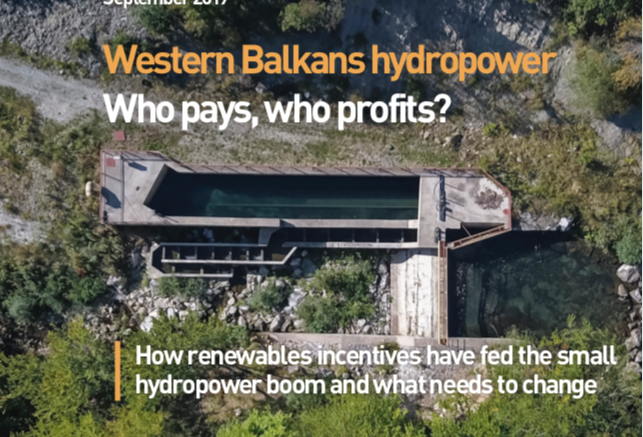Disproportionate public subsidies for small hydropower in the Western Balkans have resulted in widespread environmental damage, finds a new study released today by CEE Bankwatch Network. Even though it is changing its incentives system, Albania is still paying the most in the region to small hydropower producers, shows the report.
Fuelled by generous state-sponsored feed-in tariffs, the number of hydropower plants under 10 megawatts in Albania, Bosnia and Herzegovina, Kosovo, Montenegro, North Macedonia and Serbia quadrupled from 108 to at least 488 between 2009 and 2018. Of these, 143 are in Albania – the highest number in the region.
In 2018 no less than 70 per cent of renewable energy incentives awarded in the region benefited small hydropower. Despite this support, small hydropower only generated 3.6 per cent of total electricity.

Albania is the only country in the region apart from Serbia that has allowed feed-in tariffs for hydropower plants up to 15 MW. In 2018, 153 plants were in this category, and feed-in tariffs cost the public EUR 93.5 million – the highest amount in the region.
These plants generated 16.3 per cent of Albania’s electricity, but at an enormous environmental and social cost. Rivers like the Rrapuni near Librazhd and Fan in Mirditë have been dammed and put into derivation pipes, leaving riverbeds dry and the communities who depend on them without vital sources of water.
Since 2017, Albania has been in the process of changing its renewable energy subsidies system to one that would lower the costs for energy consumers, but the contracts already signed are still valid for several more years. Under the new system, most new hydropower projects would have to compete in auctions, but they could still be eligible for subsidies paid by electricity consume
“Albania must end hydropower subsidies and diversify its electricity generation using solar and wind,” said Olsi Nika, Executive Director of EcoAlbania “In addition, existing feed-in tariff contracts for small hydropower plants need to be reviewed as they are valid for several more years. Any which granted incentives without all the legal conditions being fulfilled or for which the environmental permits have expired must be cancelled.”








